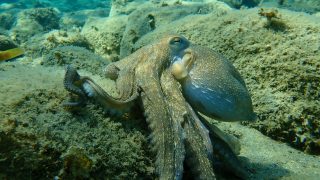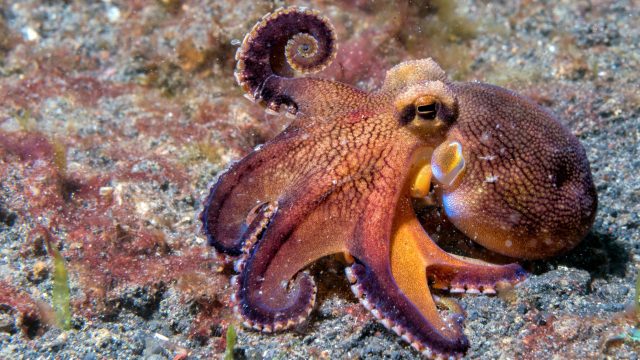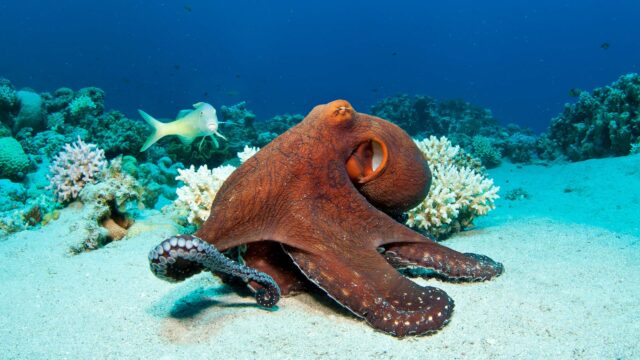
California Governor Signs Octopus Farming Ban into Law
California becomes the second state to pass a ban on octopus farming and first state to prohibit farmed octopus sales
Contact: media@aldf.org
SACRAMENTO, Calif. — Gov. Gavin Newsom signed the California Oppose Cruelty to Octopuses (OCTO) Act (A.B. 3162), which was cosponsored by Animal Legal Defense Fund and Social Compassion in Legislation, into law to prohibit octopus farming on land and water and the sale of farmed octopuses in the state. Washington state enacted the first bill banning octopus farming (H.B. 1153), and similar legislation has been introduced both in Hawaii (H.B. 2262) and in the U.S. Senate (S.4810). Lawmakers in other coastal states are considering following with their own bills to prohibit octopus farming.
These animals have significant cognitive abilities and can learn new skills, navigate complex mazes, are known escape artists, and even use tools. Due to their complex mental ability, octopuses have high enrichment needs that simply cannot be met in farming environments. Intensively confining these highly intelligent, solitary animals in unnatural farming conditions is inhumane, as there is a high likelihood of stress, aggressive activity, and high mortality among octopuses in these settings. Methods of slaughtering octopuses have historically been highly inhumane, including clubbing, slicing, asphyxiation, and chilling.
“Bipartisan support to ban commercial octopus farming in California underlines the state’s unified opposition to allowing the exploitive practice of factory farming to expand to another population of vulnerable animals,” said Animal Legal Defense Fund Senior Legislative Affairs Manager Jennifer Hauge. “We are pleased to see the bill signed into law and will continue to advocate for similar statewide and federal legislation to protect these targeted animals.”
“The passing of the OCTO Act demonstrates California’s leadership in protecting wildlife,” said Assemblymember Steve Bennett. “This is how law-making should be done: before investments of financial and human capital are made. These intelligent creatures are not suited for concentrated farming environments. I appreciate our sponsors and supporters for their advocacy.”
“Octopuses are among the most intelligent, complex life on Earth. Farming them is not only inhumane, but poses significant environmental risks,” said Assemblymember Laura Friedman. “Rather than turning to unproven “farming” methods to raise and slaughter octopuses, we should be protecting our marine ecosystem to better enable marine species to rebound.”
“We are so grateful to Governor Newsom for recognizing the need to preemptively stop octopus farming in this state,” said Social Compassion in Legislation Founder and President Judie Mancuso. “By signing this bill, California is taking a stand that will prevent an immeasurable amount of suffering to these magnificent animals and the environmental damage that this industry would create. We hope the rest of the country and the world will follow suit.”
“The case against octopus farming is clear and compelling,” said Aquatic Life Institute Head of Research Tessa Gonzalez. Aquatic Life Institute applauds California for recognizing the ethical imperative and ecological necessity of this legislation. The potential for environmental degradation, disease outbreaks, and reputational harm to seafood industries far outweigh any perceived benefits. By supporting a ban on octopus farming and farmed octopus importation, Californians are sending a powerful message that they value compassion over cruelty, sustainability over exploitation, and stewardship over short-term gain.”
In addition to the animal welfare concerns, octopus farming could have problematic environmental consequences. Aquaculture facilities for octopuses have the potential to create an increased risk of nitrogen and phosphorus runoff, contributing to environmental pollution and potential algal blooms that create low-oxygen dead zones devoid of life, disrupting local marine ecosystems. Antibiotics and pesticides may also be used to control the spread of disease and presence of parasites — as they already are with sea lice in salmon farms — and these can end up in the diets of wild fish, making them sick and disrupting food chains.
Sign Up!
Join the Animal Legal Defense Fund's email list to stay up to date on lawsuits, legislation, and regulations affecting animals.
Focus Area
How We Work
Related
-
Opposing the Cultivation and Trade of Octopus Produced through Unethical Strategies Act Introduced in the U.S. Senate
The federal bill would prevent the industry from gaining traction by banning commercial octopus farming in the U.S.July 25, 2024 News -
Octopus Farming Ban Introduced in California
Bill will ensure that octopus farms, and the inherent risks that come with them, are not allowed in CaliforniaFebruary 20, 2024 Press Release



